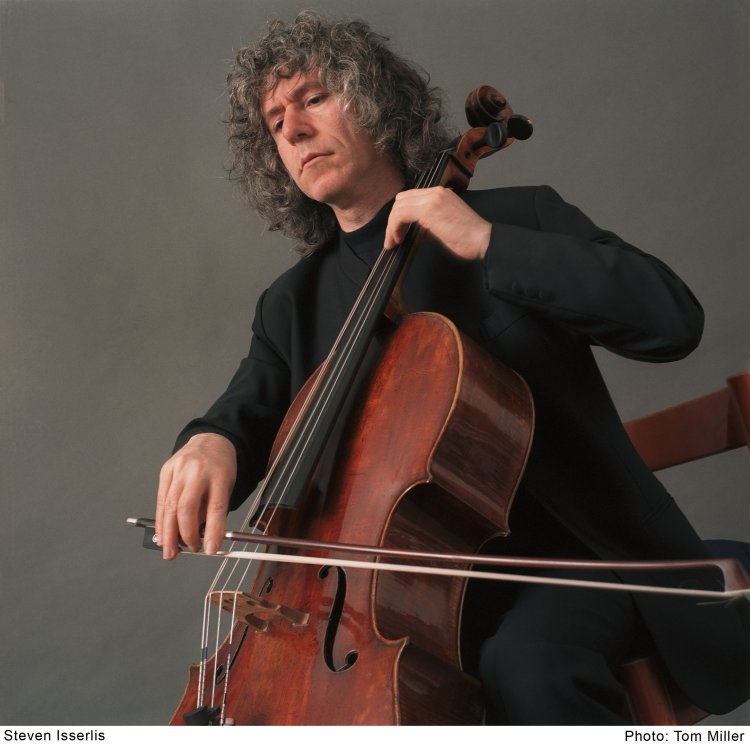

|
Steven Isserlis was born in London on December 19, 1958 into a musical family. His grandfather, Julius Isserlis, who was a Russian Jew, was one of 12 musicians allowed to leave Russia in the 1920s to promote Russian culture, but he never returned. The name 'Isserlis' is one of many European variations of the Hebrew name 'Israel'. On the Midweek Programme on 29 January 2014, Isserlis revealed that on arrival in Vienna in 1922, his pianist grandfather and father found a flat, but the 102-year-old landlady refused to take in a musician, because her aunt had a previous musician tenant who was noisy and would spit on the floor—this tenant was Ludwig van Beethoven! Steven's mother was a piano teacher, and his father was a keen amateur musician. His sister Annette is a viola player, and his other sister Rachel is a violinist. Isserlis has described how "playing music, playing together", was an integral part of his early family life. Steven went to the City of London School, which he left at the age of 14 to move to Scotland to study under the tutelage of Jane Cowan. From 1976 to 1978 Isserlis studied at the Oberlin Conservatory of Music with Richard Kapuscinski. 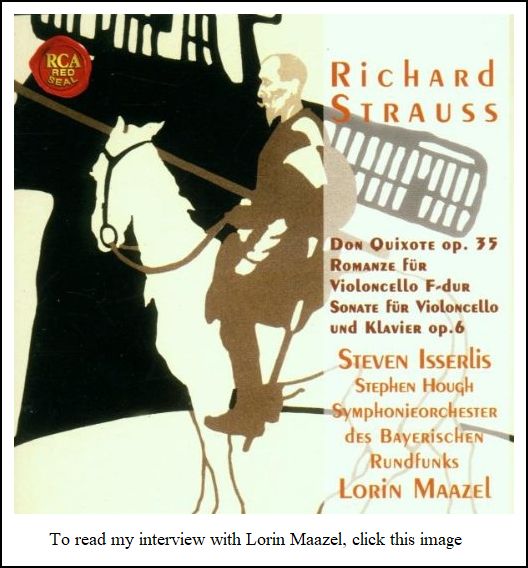 Isserlis performs solo, chamber concerts, and with orchestra.
He is a staunch advocate of lesser-known composers and of greater access
to music for younger audiences. He is committed to authentic performance,
and frequently appears with the foremost period instrument orchestras. He
has also published several editions and arrangements, principally for Faber
Music, and was an advisor on new editions of Beethoven's cello sonatas
and cello variations, as well as the cello concertos of
Dvořák and Elgar. He commissioned a new completion of Prokofiev's
Cello Concertino from the Udmurt musicologist Vladimir Blok,
which was premiered on 11 April 1997 in Cardiff, with the BBC National Orchestra
of Wales conducted by Mark Wigglesworth. Isserlis has also premiered works
by composers John Tavener (who wrote The Protecting Veil for the
cellist), Lowell Liebermann,
Carl Vine, David Matthews,
John Woolrich, Wolfgang Rihm, Mikhail Pletnev and Thomas
Adès.
Isserlis performs solo, chamber concerts, and with orchestra.
He is a staunch advocate of lesser-known composers and of greater access
to music for younger audiences. He is committed to authentic performance,
and frequently appears with the foremost period instrument orchestras. He
has also published several editions and arrangements, principally for Faber
Music, and was an advisor on new editions of Beethoven's cello sonatas
and cello variations, as well as the cello concertos of
Dvořák and Elgar. He commissioned a new completion of Prokofiev's
Cello Concertino from the Udmurt musicologist Vladimir Blok,
which was premiered on 11 April 1997 in Cardiff, with the BBC National Orchestra
of Wales conducted by Mark Wigglesworth. Isserlis has also premiered works
by composers John Tavener (who wrote The Protecting Veil for the
cellist), Lowell Liebermann,
Carl Vine, David Matthews,
John Woolrich, Wolfgang Rihm, Mikhail Pletnev and Thomas
Adès.
Isserlis plays the Marquis de Corberon cello on loan from the Royal Academy of Music. He also part-owns a Montagnana cello from 1740 and a Guadagnini cello of 1745, which he played exclusively from 1979 to 1998 and part-owns with David Waterman, cellist of the Endellion Quartet. His De Munck Stradivarius was returned to the Nippon Music Foundation in May 2011. Isserlis made his debut directing from the cello in February 2008, with the Irish Chamber Orchestra at the National Concert Hall in Dublin. He has organized a number of festivals with long-term collaborators such as Joshua Bell, Stephen Hough, Mikhail Pletnev, András Schiff, Denes Varjon, Olli Mustonen and Tabea Zimmermann, and actors Barry Humphries and Simon Callow. He is artistic director of the International Musicians Seminar, Prussia Cove in West Cornwall, where he both performs and teaches. Isserlis's recordings reflect the breadth and eclecticism of his repertoire. His most recent release of reVisions for BIS records includes arrangements and reconstruction of works by Debussy, Ravel, Prokofiev and Bloch. For Hyperion Records, Isserlis has recorded Schumann's music for cello and piano, and the complete solo cello suites by Bach, which has won many awards, including Listeners' Disc of the Year on BBC Radio 3's CD Review, Gramophone's Instrumental Disc of the Year, and "Critic's Choice" at the 2008 Classical Brits. Other releases include two recordings with Stephen Hough: the Brahms sonatas, coupled with works by Dvořák and Suk; a highly acclaimed disc of children's cello music for BIS; and a recording with Thomas Adès of his new piece Lieux Retrouves. Recent releases included a disc in 2013 of the Dvorak Cello Concerto with the Daniel Harding and the Mahler Chamber Orchestra on Hyperion and Martinu's complete cello sonatas along with a cello sonata by Olli Mustonen, and Malinconia by Sibelius in 2014 which received a Grammy nomination. In 2017, his recording of Haydn's Cello Concertos was nominated for a Grammy Award. Steven Isserlis is the author of two books for children on the lives of famous composers: Why Beethoven Threw the Stew, and Why Handel Waggled His Wig (Faber & Faber, 2001 and 2006 respectively). He has also written three stories that have been set to music by Oscar-winning composer Anne Dudley: Little Red Violin (and the Big, Bad Cello) in 2007, followed by Goldipegs and the Three Cellos, and Cindercella (published by Universal Edition, Vienna). He has also made several additions for Faber Music and sheetmusicnow.com. In September 2016, his book targeted towards young musicians Robert Schumann's Advice to Young Musicians Revisited by Steven Isserlis was published by Faber & Faber. He was appointed a Commander of the Order of the British Empire (CBE) in 1998, and collected his award with his father, as his mother had died earlier that week. He was awarded the 2000 Robert Schumann Prize of the City of Zwickau.-- Adapted from several sources.
-- Names which are links (both in this box and below) refer to my interviews elsewhere on my website. BD |
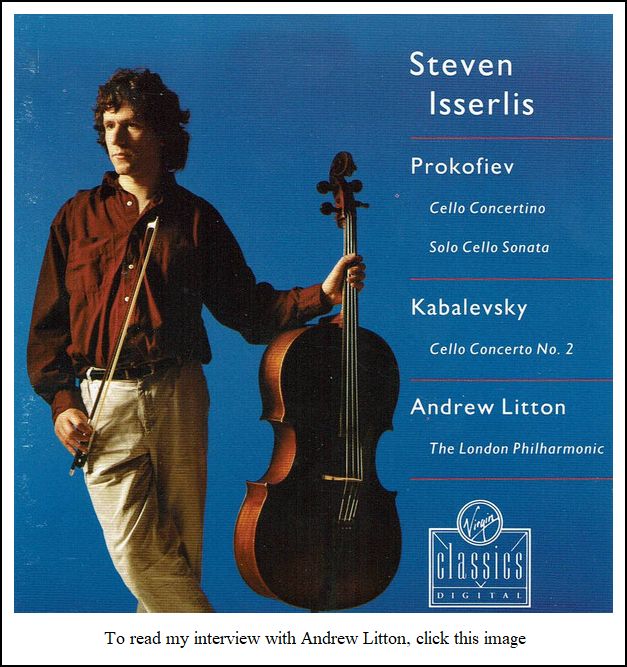 BD: Is that something you like,
or is it just happening upon you?
BD: Is that something you like,
or is it just happening upon you?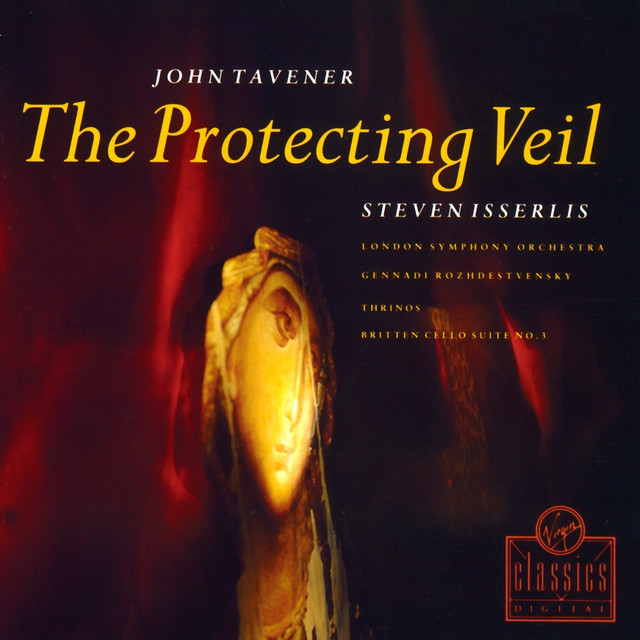 SI: To make money! [Both have
a huge laugh] As to the purpose of music, I could not tell you any
more than I could tell you the meaning of life. Each piece of music
has a different purpose. I play, perhaps not with equal pleasure
but with pleasure, a work like the Rococo Variations of Tchaikovsky,
which are charming and graceful, and meant to make people smile and enjoy
the virtuosity as an expression of joy, and then one of perhaps the most
exciting musical occasions I had recently, which was giving the first performance
of a work by John Tavener. He’s a British composer who converted to
Russian Orthodoxy some years ago, and all his music is religious now.
He’s written a huge forty-two-minute work for cello and large string orchestra.
SI: To make money! [Both have
a huge laugh] As to the purpose of music, I could not tell you any
more than I could tell you the meaning of life. Each piece of music
has a different purpose. I play, perhaps not with equal pleasure
but with pleasure, a work like the Rococo Variations of Tchaikovsky,
which are charming and graceful, and meant to make people smile and enjoy
the virtuosity as an expression of joy, and then one of perhaps the most
exciting musical occasions I had recently, which was giving the first performance
of a work by John Tavener. He’s a British composer who converted to
Russian Orthodoxy some years ago, and all his music is religious now.
He’s written a huge forty-two-minute work for cello and large string orchestra.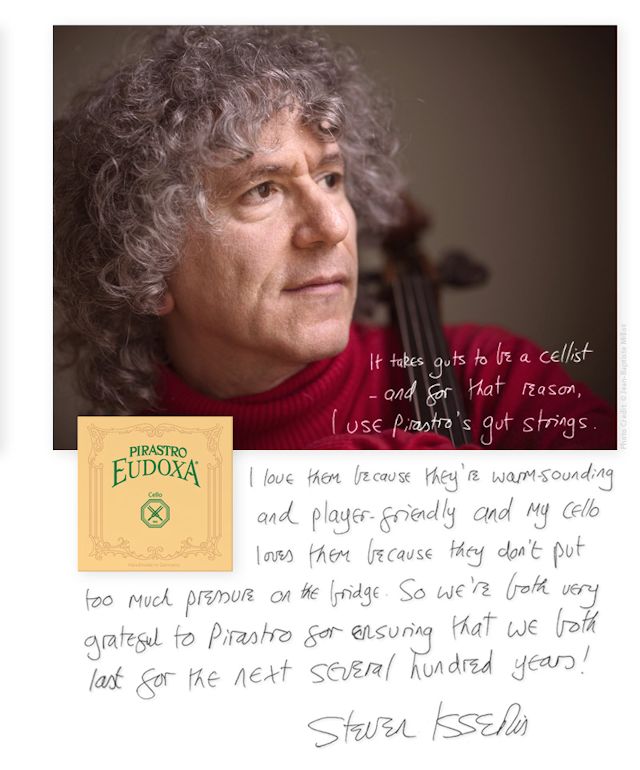 BD: You bring up the idea of music written
for different instruments. Do you ever play a different instrument,
rather than the one you play regularly?
BD: You bring up the idea of music written
for different instruments. Do you ever play a different instrument,
rather than the one you play regularly?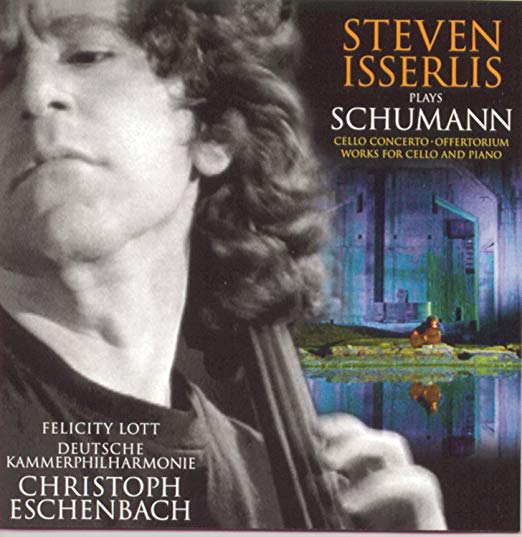 SI: Possibly... although I also have a great predilection
for French music. That’s not in my blood, though in the Fourteenth
Century my family was French. I love the language, too. [Jokingly]
I reckon that in my previous life I was a Nineteenth Century Russian
dog because I love dogs, and I love Nineteenth Century Russia. There
is a connection for me, and when I made this record, I actually wrote
the sleeve note myself because the era fascinates me. I was rather
pleased when I realized that the Glazunov pieces were written for Anatoliy
Brandukov (1859-1930), who was a cellist my grandfather used to play
with. Even the Rachmaninov Sonata was also written for Brandukov.
After he played it with Rachmaninov, he played it with my grandfather,
who was a pianist, and he also flirted with my grandmother [laughs] which
created some tension! But it’s so nice to feel this connection.
I was also pleased with the fact my family’s somehow connected to the Mendelssohn
family. I like that. It doesn’t make me, by any means, a
better interpreter of Mendelssohn’s music, or Glazunov’s music, but it’s
just a nice feeling. [Vis-à-vis the recording shown at
right, see my interviews with Felicity Lott, and Christoph Eschenbach.]
SI: Possibly... although I also have a great predilection
for French music. That’s not in my blood, though in the Fourteenth
Century my family was French. I love the language, too. [Jokingly]
I reckon that in my previous life I was a Nineteenth Century Russian
dog because I love dogs, and I love Nineteenth Century Russia. There
is a connection for me, and when I made this record, I actually wrote
the sleeve note myself because the era fascinates me. I was rather
pleased when I realized that the Glazunov pieces were written for Anatoliy
Brandukov (1859-1930), who was a cellist my grandfather used to play
with. Even the Rachmaninov Sonata was also written for Brandukov.
After he played it with Rachmaninov, he played it with my grandfather,
who was a pianist, and he also flirted with my grandmother [laughs] which
created some tension! But it’s so nice to feel this connection.
I was also pleased with the fact my family’s somehow connected to the Mendelssohn
family. I like that. It doesn’t make me, by any means, a
better interpreter of Mendelssohn’s music, or Glazunov’s music, but it’s
just a nice feeling. [Vis-à-vis the recording shown at
right, see my interviews with Felicity Lott, and Christoph Eschenbach.]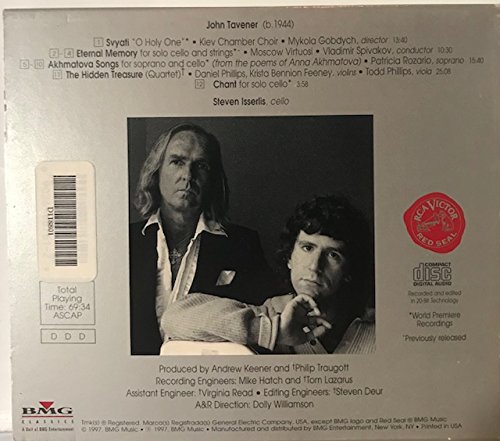 BD: What advice do you have for someone
who wants to write a concerto for you?
BD: What advice do you have for someone
who wants to write a concerto for you?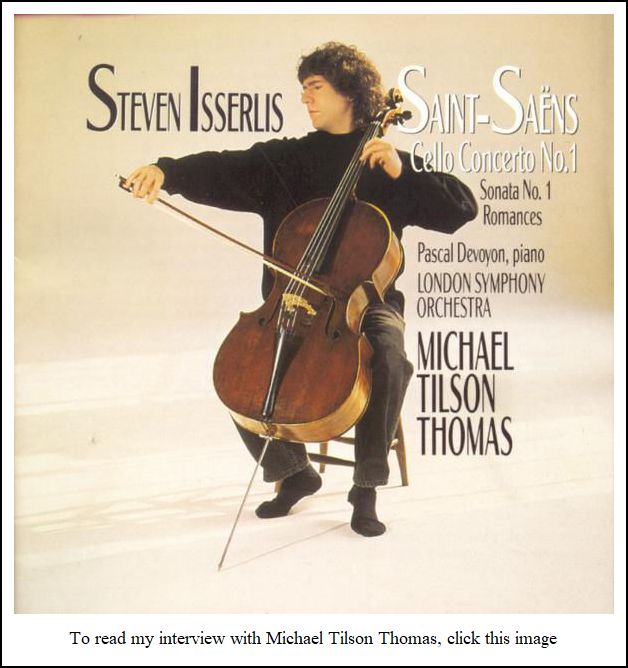 BD: What is it that makes a great cello?
BD: What is it that makes a great cello?[We then stopped for a moment, and I asked him to record at Station Break for us (“Hello, this is Steven Isserlis, and you are listening to Classical 97, WNIB in Chicago”). This was something which surprised him, and he noted that he had never done one before. We also briefly discussed the recordings which were currently available, and he seemed not to be pleased with them . . . . .]
© 1990 Bruce Duffie
This conversation was recorded in Chicago in May of 1990. Portions were broadcast on WNIB in 1993, and again in 1998. This transcription was made in 2019, and posted on this website at that time. My thanks to British soprano Una Barry for her help in preparing this website presentation.
To see a full list (with links) of interviews which have been transcribed and posted on this website, click here. To read my thoughts on editing these interviews for print, as well as a few other interesting observations, click here.
Award - winning broadcaster Bruce Duffie was with WNIB, Classical 97 in Chicago from 1975 until its final moment as a classical station in February of 2001. His interviews have also appeared in various magazines and journals since 1980, and he now continues his broadcast series on WNUR-FM, as well as on Contemporary Classical Internet Radio.
You are invited to visit his website for more information about his work, including selected transcripts of other interviews, plus a full list of his guests. He would also like to call your attention to the photos and information about his grandfather, who was a pioneer in the automotive field more than a century ago. You may also send him E-Mail with comments, questions and suggestions.